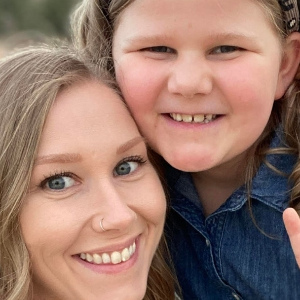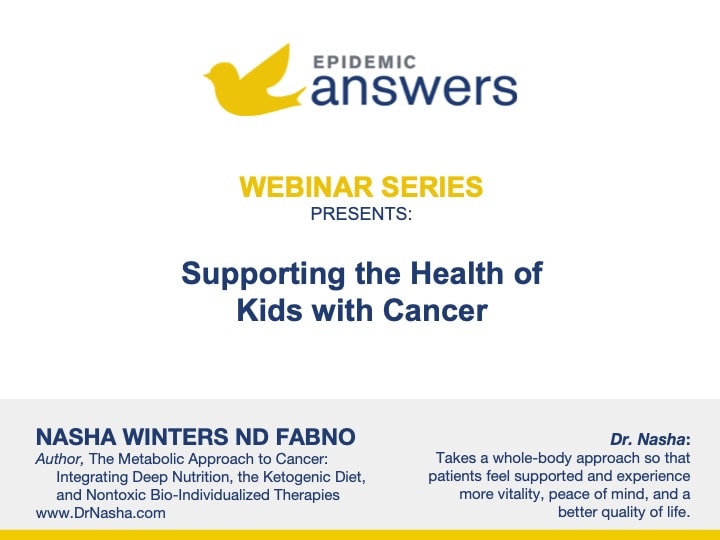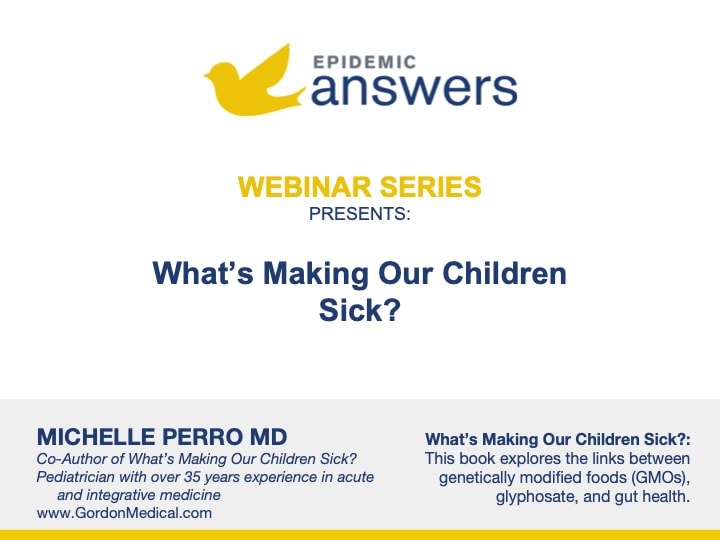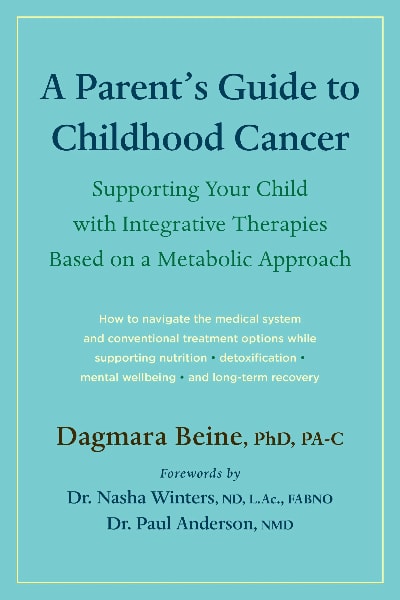We interviewed Epidemic Answers health coach Jessica Eberhart about overcoming pediatric cancer and the role of toxicity in cancer. You can watch the replay below. Please note that you will be asked to provide your email address to continue viewing this video at the 30-minute mark.
In This Interview
Shandy Laskey intervied Jessica in this Instagram live. They talked about:
- How hard it was to convince doctors to perform a biopsy
- Bioindividuality
- How Hannah’s rare type of cancer is usually only seen in agricultural workers
- How Hannah’s exposure to the glyphosate in Roundup® likely caused her cancer
- How the foods her daughter was told to eat by her mainstream practitioners were “cancer bombs”
- How cannabis oil helped
- How insurance policy dictates the standard of care in a one-size-fits-all approach
- How the family made diet and lifestyle changes
- How the family lowered their total load by replacing toxic personal-care and cleaning products with nontoxic versions
About Jessica Eberhart CHC
Jessica Eberhart is an Epidemic Answers health coach whose daughter Hannah overcame stage-four anaplastic large cell non-Hodgkin’s lymphoma with an integrative approach. You can read her daughter’s success story here.
The family made diet and lifestyle changes and used cannabis oil and other therapies. Through research, Jessica also realized that exposure glyphosate most certainly played a key role in her daughter’s diagnosis.
Jessica can be found at @momcologist_on_a_mission on Instagram.

Disclaimer
This webinar is not a substitute for medical advice, treatment, diagnosis, or consultation with a medical professional. It is intended for general informational purposes only and should not be relied on to make determinations related to treatment of a medical condition. Epidemic Answers has not verified and does not guaranty the accuracy of the information provided in this webinar.
Still Looking for Answers?
Visit the Epidemic Answers Practitioner Directory to find a practitioner near you.
Join us inside our online membership community for parents, Healing Together, where you’ll find even more healing resources, expert guidance, and a community to support you every step of your child’s healing journey.
Sources & References
Accurso, A., et al. Dietary carbohydrate restriction in type 2 diabetes mellitus and metabolic syndrome: time for a critical appraisal. Nutr Metab (Lond). 2008 Apr 8:5:9.
Aggarwal, B.B., et al. Molecular targets of dietary agents for prevention and therapy of cancer. Biochem Pharmacol. 2006 May 14;71(10):1397-421.
Allen, B.G., et al. Ketogenic diets as an adjuvant cancer therapy: History and potential mechanism. Redox Biol. 2014:2:963-70.
Anand, P., et al. Cancer is a preventable disease that requires major lifestyle changes. Pharm Res. 2008 Sep;25(9):2097-116.
Bahr, L.S., et al. Ketogenic diet and fasting diet as Nutritional Approaches in Multiple Sclerosis (NAMS): protocol of a randomized controlled study. Trials. 2020 Jan 2;21(1):3.
Coller, H.A. Is cancer a metabolic disease? Am J Pathol. 2014 Jan;184(1):4-17.
Duan, W., et al. Hyperglycemia, a neglected factor during cancer progression. Biomed Res Int. 2014:2014:461917.
Giovannucci, E., et al. Diabetes and cancer: a consensus report. Diabetes Care. 2010 Jul;33(7):1674-85.
Labbé, D.P., et al. Role of diet in prostate cancer: the epigenetic link. Oncogene. 2015 Sep 3;34(36):4683-91.
Liu, H., et al. Refined fructose and cancer. Expert Opin Ther Targets. 2011 Sep;15(9):1049-59.
Lombardi, C., et al. Residential proximity to pesticide application as a risk factor for childhood central nervous system tumors. Environ Res. 2021 Jun;197:111078.
Lorenzi, M., et al. High glucose induces DNA damage in cultured human endothelial cells. J Clin Invest. 1986 Jan;77(1):322-5.
Mancini, M., et al. Association between Residential Proximity to Viticultural Areas and Childhood Acute Leukemia Risk in Mainland France: GEOCAP Case-Control Study, 2006-2013. Environ Health Perspect. 2023 Oct;131(10):107008.
Onodera, Y., et al. Increased sugar uptake promotes oncogenesis via EPAC/RAP1 and O-GlcNAc pathways. J Clin Invest. 2014 Jan;124(1):367-84.
Seyfried, T.N. Cancer as a metabolic disease. Nutr Metab (Lond). 2010 Jan 27:7:7.
Seyfried, T.N. Cancer as a metabolic disease: implications for novel therapeutics. Carcinogenesis. 2014 Mar;35(3):515-27.
Seyfried, T.N., et al. Consideration of Ketogenic Metabolic Therapy as a Complementary or Alternative Approach for Managing Breast Cancer. Front Nutr. 2020 Mar 11:7:21.
Seyfried, T.N., et al. Is the restricted ketogenic diet a viable alternative to the standard of care for managing malignant brain cancer? Epilepsy Res. 2012 Jul;100(3):310-26.
Seyfried, T.N., et al. Metabolic management of brain cancer. Biochim Biophys Acta. 2011 Jun;1807(6):577-94.
Takano, T., et al. Glutamate release promotes growth of malignant gliomas. Nat Med. 2001 Sep;7(9):1010-5.
Tinkum, K.L., et al. Fasting protects mice from lethal DNA damage by promoting small intestinal epithelial stem cell survival. Proc Natl Acad Sci U S A. 2015 Dec 22;112(51):E7148-54.
Resources
Books
Beine, Dagmara. A Parent’s Guide to Childhood Cancer: Supporting Your Child with Integrative Therapies Based on a Metabolic Approach. Chelsea Green Publishing, 2024.
Bernstein, Richard K. Dr. Bernstein’s Diabetes Solution: The Complete Guide to Achieving Normal Blood Sugars. Little, Brown Spark, 2011.
Perro, Michelle MD, et al. What’s Making Our Children Sick?: How Industrial Food Is Causing an Epidemic of Chronic Illness, and What Parents (and Doctors) Can Do About It. Chelsea Green Publishing, 2017.
Seyfriend, Thomas. Cancer as a Metabolic Disease: On the Origin, Management, and Prevention of Cancer. Wiley, 2012.
Winters, Nasha. The Metabolic Approach to Cancer: Integrating Deep Nutrition, the Ketogenic Diet, and Nontoxic Bio-Individualized Therapies. Chelsea Green Publishing, 2017.
Websites
Dr. Bernstein’s Diabetes Solution
Metabolic Terrain Institute of Health



